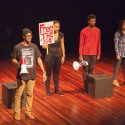Exhibit exploring Nazi persecution of homosexuals comes to campus
The Madison Gay Straight Alliance for Safe Schools (GSAFE) is hosting the United States Holocaust Memorial Museum traveling exhibition, Nazi Persecution of Homosexuals 1933-1945, at the Memorial Library between Oct. 10 and Dec. 10.
The exhibit and related events, which are free and open to the public, are co-sponsored by the University of Wisconsin–Madison General Library System and the George L. Mosse Fund for LGBT History at UW–Madison.
The exhibit features 32 panels exploring 12 topics dealing with the chronological history of the Nazi regime and the homophobic Nazi ideology via photographs, texts and documents.
“It’s a powerful exhibition that teaches us about a part of history that often is left out of history lessons,” says Cindy Crane, executive director of GSAFE.
Crane collaborated with John Tortorice, director of the George L. Mosse Program in History at UW–Madison and Lee Konrad, director of the Memorial Library to find an appropriate place to temporarily house the traveling exhibit.
“Our position as one of the premier academic research libraries in the country and our collection strengths in Western European studies made Memorial Library an attractive environment to the organizers,” Konrad says of the exhibit’s location.
UW-Madison German professor Jim Steakley, who served as a consultant to the exhibition before it was first displayed in 2002, points out that the library’s academic ambiance suits the content of the exhibit.
“I think that this topic is so somber that it would be incorrect to set this up, for example, in the lobby of the Memorial Union where people are making ice cream cones and running back and forth from the terrace,” he says. “I think it’s a quieter place and invites more in terms of reflection.”
Events accompanying the exhibition, including a Panel of Scholars, which includes Steakley, a musical performance representing the homosexual culture in Germany before the Nazi regime, a performance by Proud Theater, a Madison-based youth theater group that focuses on LGBT issues and various films and lectures, are themed “From Hate to Hope.”
In addition to the national exhibition, three panels will be displayed in Memorial Library featuring local content regarding the history of gays and lesbians in Wisconsin and of the gay liberation movement in Wisconsin.
The addition of the hopeful motif to an exhibition of such a horrifying period in history serves to highlight how far the LGBT community has come in gaining acceptance and tolerance since the Nazi persecution.
“There is much more awareness now of the issues, and there is a certain, at least level, of tolerance if not acceptance,” Tortorice says. “There has been some progress and hopefully there’s more progress to come.”
The positive contrast to the persecution also exists to add an element of encouragement for high school and middle school aged guests.
“[LGBT history] is really invisible in a lot of schools,” Crane says. “There are many good teachers out there, but what we discovered too was that there were almost no resources to teach LGBT in high school. So this exhibition is an opportunity to shine light on history, to talk about other LGBT history, and also to remind us what happens when prejudice goes unchecked.”
In fact, through various grants, GSAFE will pay for bussing for several high school and middle schools around the state to come to Madison to view the exhibition.
Konrad adds that the exhibition will provide young visitors with a chance to get acquainted with the Madison community and get them thinking about their academic futures.
“In terms of the K-12 community, I believe that the Library’s involvement in this program serves as an extension of our educational mission,” he says. “Students from around the state and elsewhere will have an opportunity to view the exhibit, attend lectures given by world-class scholars, and be exposed to the exciting environment in which all of this discussion is taking place. One of Memorial Library’s major goals in taking part in initiatives such as this is to provide access to materials that inspire future scholarly pursuits.”
While everyone involved hopes the event will attract viewers of all sexual orientation, Steakley says the exhibit and events will have the biggest impact on the LGBT community.
“I do think it’s especially important for LGBT people to learn about their own history because there’s a way in which history is extremely important for creating a sense of self worth and identity and a sense of pride,” he says. “Although the hate part of this exhibition is kind of scary, it’s important to know how far tolerance has gone in the 20th century.”
Tags: diversity, events, history, international


